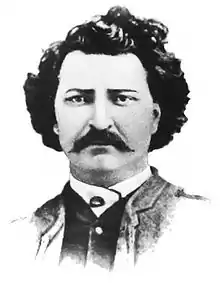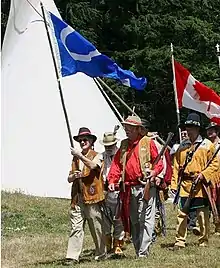List of Métis people
This is a partial list of Canadians who are Métis people.
| Indigenous peoples in Canada |
|---|
.JPG.webp) |
|
|
The Métis are a specific group of people, primarily from Manitoba, Saskatchewan, and Alberta, who have Indigenous (primarily Cree) and European (primarily French) ancestry.[1][2] They have a shared history and Michif language.
Prominent Métis
Historical

Louis Riel, c. 1884
- Howard Adams, Métis activist, author, and leader
- Andre Beauchemin, Métis; First Member of the Legislative Assembly of Manitoba for St. Vital (French Party) 1870–1874. In November 1872, Beauchemin offered to resign his seat in the Manitoba assembly so that Riel could be elected in a by-election
- Pierre Bottineau, Minnesota frontiersman, surveyor, diplomat and translator
- Michel "Mitch" Bouyer, Métis of French Canadian and Sioux ancestry; interpreter and guide in the Old West; lead scout with the US Seventh Cavalry; died along with Lt.Col. George Armstrong Custer at the Battle of Little Bighorn on June 25, 1876
- James P. Brady, Métis politician and activist
- Pierre Delorme, Métis politician and activist. Elected as a Member of Parliament in 1871, defeated in 1874 and re-elected in 1878[3]
- Gabriel Dumont, Métis military leader during the North-West Rebellion
- Cuthbert Grant, Métis political and military leader
- James Isbister, was a Canadian Métis leader and he is considered to be the founder of the city of Prince Albert, Saskatchewan.
- Josette Vieau Juneau, Métis "founding mother" of Milwaukee.
- Thomas McKay, was a Metis farmer and political figure who was the first mayor of Prince Albert, Saskatchewan
- John Norquay, Métis politician, Premier of Manitoba from 1878 to 1887
- Malcolm Norris, Métis politician, activist, and leader. Norris was a founder and the first vice-president of the first Alberta Métis organization (1932) called the Association des Métis d’Alberta et des Territories du Nord-Ouest (Alberta Métis Association). In 1964, he headed the Métis Association of Northern Saskatchewan
- Louis Riel, Métis leader who led the Red River Rebellion in 1869 - 1870, the provisional government of Rupert's Land, Manitoba's entry into Confederation in 1870; later led the North-West Rebellion in 1885[4] Riel was elected three times to the House of Commons for Provencher riding; first, in the general election of 1873, the government subsequently resigned over the Pacific Scandal in November 1873. Riel was reelected in February 1874, then expelled, then ran in the subsequent by-election, was reelected and expelled again[5]
- Guillaume Sayer, a Métis fur trader whose trial was a turning point in the ending of the monopoly of the Hudson's Bay Company (HBC) of the fur trade in North America[6]
- Louis Schmidt, Métis politician, Riel's Secretary and, in their youth, Riel's classmate. Born in 1844 he was known as Louis Laferté until Bishop Taché changed it in 1858. Louis Schmidt made the first of numerous petitions on behalf of the Métis' to the federal government over rights to their lands and their call for proper political representation. See Louis Schmidt: A Forgotten Métis in Riel and the Métis Ed. A.S Lussier (1979) Manitoba Métis Federation Press
Architects
- Douglas Cardinal, architect; of Métis and Blackfoot ancestry. He designed the Museum of Canadian History and did the building designs for the Oujé-Bougoumou community of the James Bay Cree. This work won the “We the People” United Nations Community Award[7]
Artists and writers

George R. D. Goulet, 2007 (shown carrying the Métis flag) and leading the Grand Entry at the Red River West celebration
- Keith Barker, playwright
- Be'sha Blondin, Deme Elder, health activist and founder and director of Northern Integrated Culture with the Environment (Northern ICE), which strengthens Aboriginal communities in the North
- Katherine Boyer, Métis/Settler artist[8]
- Terril Calder, animator and artist
- Joe Fafard (artist), Métis artist from Saskatchewan whose work has been featured across Canada and around the world
- Sandra Birdsell, daughter of a Métis man and a Russian Mennonite woman; based her award-winning novel Children of the Day in part on her parents' experiences in Manitoba in the 1920s to 1950s
- Robert Boyer (1948–2004); Métis Cree artist, best known for his politically charged "Blanket Statements" series of paintings[9]
- Maria Campbell, Métis writer and filmmaker; born in northern Saskatchewan in 1940; brought the struggles of modern-day Métis and Aboriginal people to the public through her breakthrough book, Halfbreed (1973), and the collaborative play, Jessica (1982); captured the sound and song of traditional stories through her work in dialect, Stories of the Road Allowance People (1996)[10]
- Laura de Jonge, Métis family advocate, corporate social responsibility practitioner, filmmaker and magazine founder
- Cherie Dimaline, writer, was awarded the Anskohk Fiction Book of the Year Award in 2013
- Danis Goulet, filmmaker
- George R. D. Goulet, best-selling Métis author; books include The Trial of Louis Riel: Justice and Mercy Denied, The Metis: Memorable Events and Memorable Personalities, and The Métis in British Columbia: From Fur Trade Outposts to Colony
- Matthew MacKenzie, playwright
- Dylan Miner, Métis printmaker, writer and conceptual artist[11]
- Rick Rivet (born 1949), painter
- Gregory Scofield, acclaimed poet, beadwork artist, dramatist, non-fiction writer, activist and educator[12]
- Jesse Thistle, academic and writer
- Kamala Todd, community planner, filmmaker, curator
- Loretta Todd, filmmaker, producer, cultural theorist
- Katherena Vermette, writer
- Rhayne Vermette, filmmaker
- Christine Welsh, documentary filmmaker and academic
Musicians
- Arlette Alcock, musician, songwriter, and social activist
- Andrea Menard, actress, playwright, and singer
- Amanda Rheaume, singer-songwriter
- Berk Jodoin, singer-songwriter
- Celeigh Cardinal, singer-songwriter
- Jani Lauzon, musician
- Kinnie Starr, musician
- Laura Vinson, musician
- Rod Olstad, musician
- Ruby Waters, musician
- Sister Ray, singer-songwriter
Politicians, activists, lawyers, physicians and judges
- André Beauchemin Métis politician in Manitoba
- Rod Bruinooge, Métis; Member of Parliament for Winnipeg South (Conservative Party of Canada); Parliamentary Secretary to the Minister of Indian Affairs & Northern Development; Federal Interlocutor for Métis and Non-Status Indians from 2005 until the fall of 2008
- Brian Bowman, Métis; mayor of Winnipeg
- Thelma J Chalifoux, Métis; community activist; First Aboriginal Woman appointed to the Senate of Canada on November 26, 1997, established Michif Cultural and Resource Institute[13]
- Clément Chartier, Métis Canadian leader who served as President of the World Council of Indigenous Peoples between 1984–87 and vice-president between 1993 and 1997
- David Chartrand, Métis politician and aboriginal activist in Manitoba, Canada, who has been the leader of the Manitoba Metis Federation since 1997 to the present[14]
- Todd Ducharme, Métis; appointed as a judge in 2004 of the Ontario Supreme Court of Justice
- Shelly Glover, Métis; Member of Parliament for Saint-Boniface (Conservative Party of Canada) 2008–2015; Parliamentary Secretary for Official Languages
- Carole James, former British Columbia New Democratic Party leader; Métis
- Bertha Clark-Jones, Cree-Métis activist and Royal Canadian Air Force member
- Rick Laliberte, Canadian former politician from Beauval, Saskatchewan who is fluent in Cree-Michif
- Glen McCallum, Métis politician from Pinehouse, Saskatchewan who was first elected to serve as President of Métis Nation—Saskatchewan on 27 May 2017[15] and was re-elected on 29 May 2021[16]
- Bob McLeod, is a former Canadian politician
- D'Arcy McNickle, writer, Native American activist, college professor and administrator, and anthropologist of Irish and Cree-Métis descent. He enrolled in the Salish Kootenai nation, as his mother has come to Montana with the Métis red river rebellion refugees
- Gerald Morin, Métis politician who served as president of the Métis National Council and the Métis Nation—Saskatchewan, also serving as vice president for the latter
- Derrick O'Keefe, Rabble.ca editor; Canadian anti-war movement leader; Métis
- Dan Vandal, Métis; Member of Parliament for Saint-Boniface and Saint-Vital (Liberal Party of Canada) 2015-current; Parliamentary Secretary for Indigenous Services
Military
- Francis Godon, member of the Royal Winnipeg Rifles during the Second World War
- Henry Norwest, First World War sniper
Sports
- Calen Addison, professional ice hockey player for the Minnesota Wild
- Arron Asham, professional ice hockey player

Sharon Bruneau, a Canadian champion bodybuilder
- René Bourque, NHL hockey player; from Lac La Biche, Alberta; a Métis
- Sharon Bruneau, bodybuilder and fitness model
- Kyle Chipchura, NHL player, of Métis ancestry
- Connor Dewar, professional ice hockey player for the Minnesota Wild
- Kerri Einarson, Canadian national curling champion
- Theoren Fleury, Canadian former professional ice hockey player
- Travis Hamonic, professional ice hockey player for the Ottawa Senators
- Dwight King, professional ice hockey player for the Los Angeles Kings
- Heather Mandoli, Canadian Olympic Rower; of Métis ancestry
- Anthony Carelli, former professional wrestler (known as Santino Marella) of Italian and Métis descent
- Vic Mercredi, Atlanta Flames first round draft pick
- Kevin O'Toole, 1996 North American light heavyweight bodybuilding champion
- Wade Redden, NHL defenceman; of Métis ancestry
- Sheldon Souray, NHL defenceman; of Métis ancestry
- Bryan Trottier, NHL Hall of Fame center
- Terry Fox, creator of marathon of hope
Others
- Tantoo Cardinal, actress; of Métis and Cree ancestry
- Roseanne Supernault, actress; Métis of Cree descent
- Zoe Todd, academic
- Siera Bearchell, Miss Universe Canada 2016; of Métis descent
Notes
- "Métis Nation". Library Archives Canada. 15 October 2013.
- "Métis Homeland - Rupertsland Institute". www.rupertsland.org. Retrieved 2021-07-24.
- Barkwell, Lawrence. https://www.scribd.com/document/324121091/Metis-Members-of-the-Legislative-Assembly-of-Manitoba
- Reasonable doubts may be raised about whether either of these events was a rebellion. For example, the actions considered rebellious in 1869 were undertaken by Riel as the leader of a government recognized by Canada as in legitimate control of territory that did not belong to Canada; Canada negotiated the Manitoba Act with this government. After these "rebellions", land speculators and other non-Métis effectively deprived the Métis of land by exploiting a government program for its purchase, with the government perhaps turning a blind eye. The province of Alberta distributed land to Métis in 1938 to correct what it believed to be an inequity, but Saskatchewan and Manitoba have not followed Alberta's lead.
- "Biography – RIEL, LOUIS (1844-85) – Volume XI (1881-1890) – Dictionary of Canadian Biography".
- "Encyclopedia of the Great Plains | PIERRE-GUILLAUME SAYER TRIAL". plainshumanities.unl.edu. Retrieved 2021-07-10.
- http://www.metismuseum.ca/media/document.php/11995.Douglas%20Cardinal.pdf
- "About". Katherine Boyer. Retrieved 2021-07-25.
- Jacoby-Smith, Jennifer. "The Painterly Life of Bob Boyer." University of Saskatchewan: Green and White. Winter 2005 (retrieved 23 November 2009)
- Maclean's, September 8, 2005.
- "Membership." Archived 2006-04-20 at the Wayback Machine Aboriginal Curatorial Collective. (retrieved 13 February 2010)
- Barkwell, Lawrence. http://www.metismuseum.ca/media/document.php/13481.Gregory%20Scofield.pdf
- Derworiz, Colette (6 October 2017). "Thelma Chalifoux was the first Métis woman to serve in Canada's Senate". The Globe and Mail.
- "Manitoba government has 'clearly abandoned' Métis people, says federation". CBC News, November 17, 2015.
- "Newly elected Métis Nation of Sask. president optimistic for future". CTV Saskatoon. Bell Media. 28 May 2017. Retrieved 2 June 2021.
- D'Andrea, Jeff (30 May 2021). "McCallum re-elected as MN-S president; full election results". paNOW. Pattison Media. Retrieved 2 June 2021.
This article is issued from Wikipedia. The text is licensed under Creative Commons - Attribution - Sharealike. Additional terms may apply for the media files.